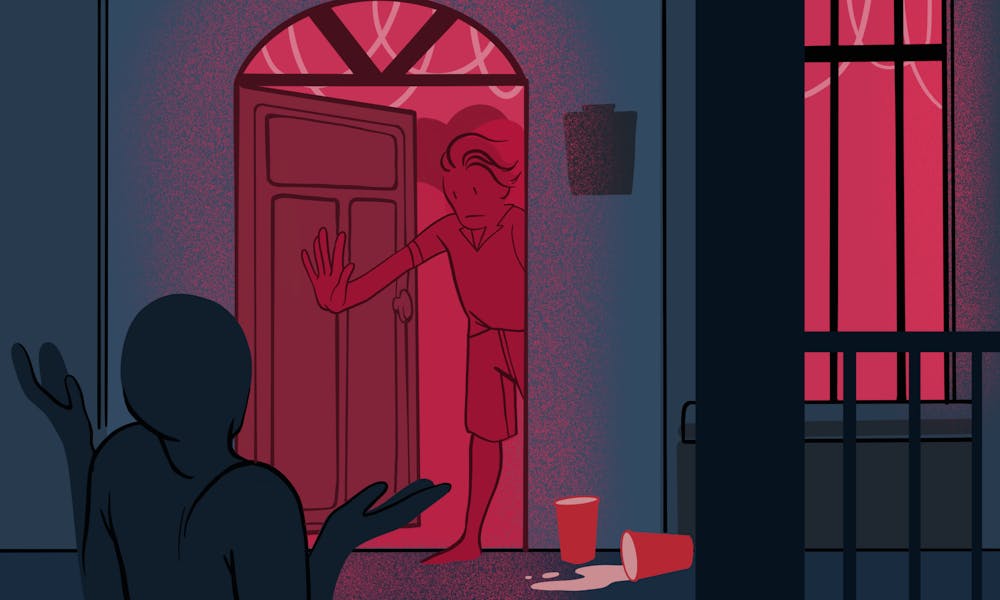
As the conversation around fraternity culture at Penn continues in the wake of the Castle assault, I can’t help but feel far removed from the issue to begin with. I pass Castle almost every day on Locust Walk, but I know I will probably never step foot inside.
When I got to Penn a little over a month ago, I was excited for what my first year would look like on campus. Unlike my friends at other Ivy League schools, I didn’t have to worry that academics would completely dominate my college experience; I was going to the “Social Ivy.” I would follow Penn’s famous “work hard, play harder” mantra as I spent my weekdays grinding in the library and weekends having a great time. But what I quickly realized was that the “Social Ivy” experience that is so integral to many a Penn student’s identity was not made for students like me.
My friends and I would get ready and dressed up to go out on a Friday, only to be rejected from every party we tried to enter. At the end of the night, all we had done was walk around in circles while we passed white students having their quintessential, picture-perfect college night out.
One night, my friends and I began mingling with a group of white girls as they were exiting a fraternity party. We explained to them that we’d had no luck getting into parties so far. One of them said to us, “You guys are so pretty — they have to let you in!” At that moment, their naivety became obvious. It occurred to me that my experience on a night out was fundamentally different from that of my white peers. They didn't have to wonder if they'd find success. They thought a perceived lack of beauty was the only reason a fraternity brother wouldn't let a girl in.
It soon became routine for us to seek out non-Penn parties, at Temple or Drexel. We refer to these parties as “Black parties” because the word “party” alone is assumed to be not for us. Walking 30 minutes through North Philadelphia or splitting the costs of Ubers, we had to do a lot just to have the same fun our white peers found on campus.
We didn’t have to worry about historically Black fraternities at Temple telling us to “take a lap” but letting a group of white students behind us go inside without hesitation. Or, “We’re full right now.” Or, “Trust me, you don’t even want to be in there.”
Granted, it's not impossible for Black students or other students of color to get into non-Black fraternity parties. It’s all about who you surround yourself with: you can use someone else’s privilege to your social advantage. A group of Black students trying to enter a party is not desirable. A group of white students with one or two Black students is. Unfortunately, as a Black student, tokenizing yourself is the most reliable way to participate in this part of Penn’s social scene.
Fraternity parties aren’t the only events that make up Penn’s social scene. But on a campus where an estimated 25% of students are involved with Greek life and the so-called first-year experience revolves around those fraternity parties, it’s pretty hard not to notice when you’re being excluded. Not being wanted at a party is about more than just a missed opportunity for fun. It’s about the subtle reinforcement that, as Black students, we don’t belong. And that feeling of otherness lasts longer than just one night.
It taints the next four years as we further isolate ourselves and feel a greater sense of disconnect from the Penn community. When Black students constantly associate their social lives with leaving campus, they begin to question the place they have at Penn.
Like much of the outside world, Penn is segregated by race. People tend to gravitate toward others who look like them, especially in a new, unfamiliar environment like college. But the social scene doesn’t have to be the same way.
I’m not saying that we should abolish Greek life. I just think Greek life at Penn can and should be more inclusive. In their membership, of course, but also in their interactions with the general student body, which is mostly through parties.
When we’re open to venturing outside our segregated bubbles, we are free to socialize and have fun with each other. Penn should live up to its name as the “Social Ivy” for all students who want to participate, not just a select group.
YOMI ABDI is a Wharton first year studying finance from Chicago. Her email is yomiabdi@wharton.upenn.edu.
The Daily Pennsylvanian is an independent, student-run newspaper. Please consider making a donation to support the coverage that shapes the University. Your generosity ensures a future of strong journalism at Penn.
Donate







